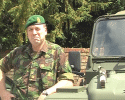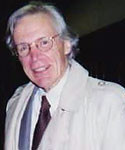
|
| Home | ||||
| News | ||||
| Kosovo 2005 | ||||
| Kosovo 1999 | ||||
Building
Peace
|
||||
| Links | ||||
| Contact |
© Karen Thomas 2005
The aid debate
|
Click
to hear views of representatives
of NGOs, the military and
the report co-author on
the aid debate. |
|
Victoria
Hawkins Médecins sans Frontières International NGO |
Major Andy Reeds |
Larry
Minear co-author Feinstein Report on Civilian Security |
The US Feinstein International Famine Centre analysed the views of local communities, military peace support operations, and NGOs in Kosovo. A key finding was that “turf issues” between the military and NGOs could undermine the peace and security of local civilians. Larry
Minear, report co-author,
says, “The stakeholders
in the report felt that the
local perspective was the
least understood and they
felt that the views of the
aid personnel and military
were better known”. The UK NGO-Military Contact Group, an informal assembly of individuals from the UK Ministry of Defence, Foreign Office, Department for International Development, various NGOs and academic groups, commissioned the report. One member, who does not wish to be named, said the report's findings were not a shock as both the military and NGOs knew they were too preoccupied with their own respective protection in unstable zones. “There are ongoing concerns from the NGO and military sides that we do too little to address civilian needs in conflict." Security for civilians going about their daily lives, for example going escorted to the market, was often overlooked. This member went on to say that NGOs sometimes struggle to engage meaningfully with people. This is especially problematic in divided communities, as the representatives of such communities can be hard to identify. Regarding the military, they added: "A couple of military people said they found it salient to have even the issue of civilian concerns raised because it hadn't even crossed their minds."
Another issue debated by the group is whether the military can deliver humanitarian assistance alongside the NGOs. Armies are directed by politics and must act where their government dictates. NGOs are directed towards those most in need, bound by the humanitarian principles of impartiality, independence and neutrality. But NGOs claim their independence is compromised by the military carrying out "humanitarian missions", leading to civilians being confused about the aid they receive and even becoming hostile to aid workers. This is seen as inevitable while NGOs and the military occupy the same humanitarian operational space. They are both trying to deliver assistance but often with different objectives. Victoria Hawkins, Head of Programmes for Médecins sans Frontières UK, says MSF participates in the UK-NMCG meetings but is adamant that following three principles are essential if NGOs are to work with vulnerable populations. She rejects suggestions that there should be an overall authority coordinating NGO and military work. “The
fundamental implication is
that we are all on the same
side. MSF is not on anybody’s
side. MSF searches for the
space in the middle and in
that space we hope to reach
the civilians affected by
the conflict.” Jan Komrska, former aid worker for Pharmacien sans Frontières, took care to ensure he maintained his independence during the Kosovo war. “We were not trying to use the military as a vehicle to bring the drugs to the population. We wanted the civilians to know we were giving them independent, non-military assistance.”
But the military also have difficulties when working with NGOs. Major Andy Reeds, of the UK Defence Media Operations Centre, argues that aid workers can be needlessly uncooperative. “The
quality of the people that
you have to deal with is
very variable. Some of them
are very precious and very
difficult to deal with.
Quite a lot of them have
very fixed and stereotype
left-wing views of what
the armed forces do”. Dr John Mackinlay, the UK Joint Services Command and Staff College, adds that humanitarians can be careless of security and oblivious to any military campaigns. “They are unconditional when dishing out aid to all and sundry including people who oppose the peace process.” He also argues that if a civilian is hungry they do not care whether it’s a soldier or an aid worker that gives them food. Dr Hugo Slim, Chief Scholar at Geneva’s Centre for Humanitarian Dialogue, agrees there is some truth in “what is it and how it’s given” is more important than “who gives it”. But he understands both sides and the gap between them and founded the UK-NMCG two years ago to improve communication and mutual understanding. The Group meets every two to three months and creates ooportunities for discussion between individuals from NGOs and the UK military. The JSCSC also runs a week long course for training commanders in working alongside NGOs in peace support operations. "THe UK military is much more sophisticated and we're lucky to have them interested let alone responsive," says the UK-NMCG member. The Feinstein report recommends applying the UK-NMCG approach to other military entities such as NATO. But it also highlights that all actors in the aid debate need to listen to the civilians whose country they are trying to rebuild.
Martin
Bell on war, peace and humanity
|


